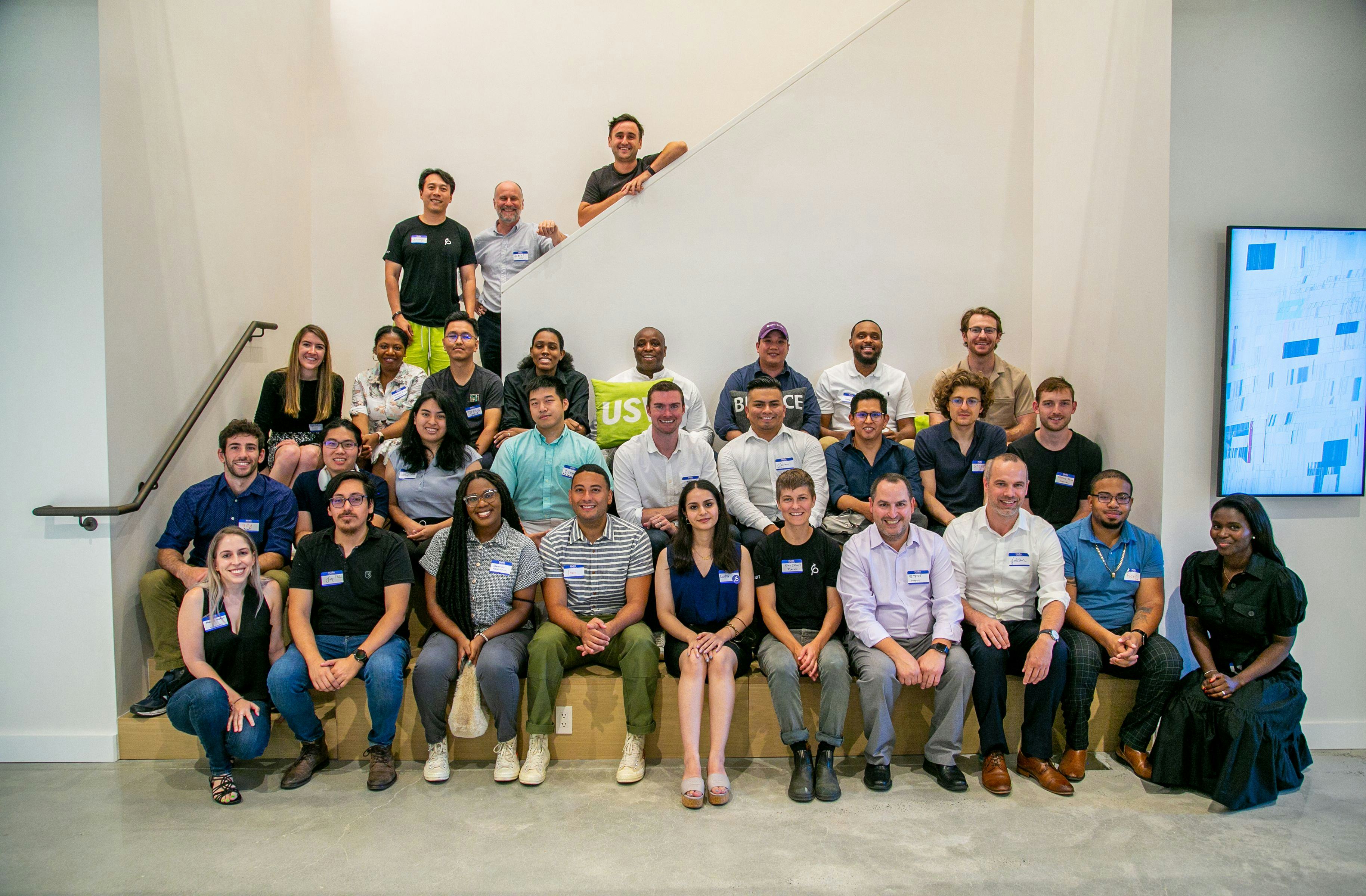In April of 2024, we interviewed our Volunteer Qian Wan. Qian started volunteering with Pursuit in 2020 through our partnership with Blackstone, and he continued as he started working at LinkedIn.
He started as a capstone technical mentor and has mentored five teams since then. Most recently, Qian supported a handful of Employment Fellows who applied to the REACH apprenticeship at LinkedIn by conducting mock technical interviews and sharing insights on the hiring process.
How did you learn about Pursuit and in what ways do you volunteer with us?
I learned about Pursuit 10 years ago when it was Coalition for Queens. I loved the mission and even though I wasn’t an “official” software developer at the time, I blasted an email over to the organization and asked if there’s anything I could do to help and the rest was history.
I did a bit of everything! I had the privilege to conduct mock interviews, work with extremely talented groups of fellows through their capstone projects, and even host some of them at the LinkedIn office!
What inspired you to start volunteering with us?
From the outset, Pursuit’s mission resonated deeply with me: to empower underserved members of our community to provide them the incredible trajectory to financial freedom. This mission was compelling with a straightforward measure of success. The success stories of our fellows career advancements were also a source of inspiration for me as I navigate my own career.
What’s been a highlight of your volunteering experience with us so far?
To be honest, whenever a fellow that I had the pleasure of working with found their first role! I follow Pursuit’s LinkedIn page for these dopamine hits. Keep em coming!
What’s been your journey to becoming a Software Engineer?
Like all the Pursuit fellows, I also started software development before my title was officially software engineer. At the time I worked as a QA automations engineer at a hedge fund. I used a JavaScript-like language called JScript for end to end testing. I broke the system down into modular components, allowing me to build tests often faster than other developers could complete the feature and that enabled test-driven development. Eventually, I volunteered to build web apps for the team while hinting to my manager that I’d like to become an “official” software developer. One day, the CTO sent an email out to the team announcing that I was now part of the dev team. To this day, I believe that nobody will stop you from doing a job outside of your responsibilities and if you perform consistently, the title will naturally follow.
How do you define success, and what does that look like for you?
Success to me is enjoying life with the people you care about and doing the things you love. In a practical sense, given that a job occupies a good 8 hour chunk of our day, it plays a crucial role in our life. To me, the ultimate work life balance comes from enjoying the work you do with delightful people at work, then coming home to hobbies you love with the people you cherish at home. What this looks like exactly will change throughout your career and life, so it is important to be cognizant to be adaptive to these changes and not chase after a stale success metric.
What tech trends are you following now? What are you excited about?
You hate hearing about it and I hate talking about it – but AI. We’re at the early stages of what AI can do. In the next few years, I expect AI to change every part of the computing stack and make us rethink how we build software in its entirety. In the shorter term, I am excited about the growing capabilities of the web. Check out What Web Can Do Today!
What advice do you often give Fellows or would you give to junior developers?
Introspection is key. Know what type of learner, person, communicator you are. Do you absorb information when you are given enough time to struggle with a problem? Do you learn better if you’re just given the answer and you synthesize the information afterwards? Take control of your own growth and let your mentors know what are the best ways to empower you. It’s like giving them a cheat sheet on how to uplevel yourself!
What’s one thing — either work-related or not — you learned in the last month?
Earlier in my career, I learned that delegating work is a trust exercise. I learned to trust my team to handle a part of the work so I could free my mind to focus on the items on my plate. But this month, I learned that over-explaining was a component of this trust exercise that I had missed. Today, I am aspiring to be a better listener, minimizing over-explaining and giving more agency to others to ask the question before I answer 🙂
Is there a particular philosophy or guiding principle you live by that’s shaped your career and personal decisions.
A boring but effective philosophy that I live by is to work hard. While I am not a supporter of over-working or disregarding work-life balance, I do believe that the harder and more often you exercise your grit, the tougher you tend to become. You need to find that perfect balance of not being in the burn-out anxiety zone but applying yourself in the slightly discomfort growth zone that’s just a tad underneath that.
I believe we live in a society where unideal circumstances require us to have this toughness, like calluses on a tradesperson’s hands to help us navigate, and adapt through challenges.






